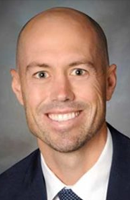Designed to educate and engage attendees, the Annual Seminar on Workers’ Compensation is recognized as the only event in the state that brings together Idaho’s workers’ compensation industry to discuss topics like current rules, procedures, and other relevant issues, while offering valuable opportunities for dialogue and networking.
This year’s sessions will include:
KEYNOTE SPEAKER |
|
Too often in the past, we’ve focused on the claims process, cost containment or efficiency and forgotten that the “claimant” is also a human being and things beyond the actual injury can reduce their motivation, elongate RTW, and increase the total cost of the claim. This session discusses the whole person approach to recovery from an injury or occupational disease, in strategic and tactical terms. |
BREAK OUT SESSIONS |
|
In this presentation, we will discuss reverse total shoulder, the relevant anatomy, biomechanics, and indications for surgery. Specifically, we will discuss when a reverse total shoulder would be considered work-related versus related to a pre-existing condition and how to differentiate. We will also discuss the typical recovery period, restrictions, and impairment. |
|
Recent Discipline Cases Joe Pirtle will discuss recent lawyer discipline cases imposing public sanctions. The presentation will address the facts and violations of the Idaho Rule of Professional Conduct at issue in each case. |
|
As the American workforce ages, workers’ compensation professionals must adapt to new medical and return-to-work challenges. This session explores how aging affects injury recovery, disability duration, and claim outcomes, with a focus on practical strategies for case management. Attendees will gain insights into comorbidities, polypharmacy, ergonomic adaptations, and ADA considerations. Join us to learn how proactive, age-informed approaches can improve outcomes for injured workers and reduce claim complexity. |
|
Industrial Commission Update: “Milestones that Matter Commissioner Sharp will present on challenges and opportunities affecting the Idaho workers’ compensation system. |
|
Join NCCI as they present the key cost drivers shaping Idaho’s workers’ compensation system, reveal timely economic insights, and deliver updates on the residual market. You’ll also gain fresh perspective on emerging trends in motor vehicle accidents and legislative developments across the western U.S. |
|
In this presentation, we will discuss common shoulder injuries related to the rotator cuff encountered in the workers’ compensation system. We will discuss the relevant anatomy, proper workup, and spend time reviewing the pearls and pitfalls related to the management of acute shoulder injuries. We will also spend some time on differentiating new injuries vs pre-existing age-related change, determining aggravation vs exacerbation, and addressing acceleration of a chronic underlying disease. Finally, we will review new treatment modalities, including the expanding use of biologics in the management of acute shoulder injuries. |
|
Some patients in the workers’ compensation system over-consume resources for reasons that do not always correlate with organic pathology. This does not mean these patients are bad people. But taking care of them can be difficult and frustrating. It requires skill. We will discuss strategies for navigating these non-organic obstacles to recovery in injured workers. |
|
Workers’ compensation has traditionally been a reactive process – addressing claims relied heavily on manual review and human judgment. However, with the rise of artificial intelligence, that paradigm is shifting. This presentation explores how AI has evolved and how it is transforming Workers’ Compensation from a reactive system to a predictive, proactive, and data-driven model. We will examine real-world use cases where AI enhances claims triage, identifies high-risk cases early, predicts claim severity, and supports faster decision making. Attendees will gain insight on how AI empowers adjusters, reduces claim cycle times, improves outcomes for injured workers, and lowers costs for carriers and employers. |
|
J. Audie Black, PhD, ABN and Melissa Kremer, PsyD will present an integrated discussion on the evaluation and treatment of PTSD in workers’ compensation cases. Dr. Black will present on the evaluation of PTSD, clarify what constitutes PTSD per the DSM-5-TR, provide a framework for objective assessment including detection of malingering or symptom exaggeration, and discuss differences between standard physical-mental injury claims and Idaho’s PTSI statute for first responders. Dr. Kremer will outline evidence-based treatments, addressing expected recovery timelines and key considerations when PTSD is complicated by co-occurring conditions such as chronic pain or concussion. The presentation will challenge myths about permanent impairment and illustrate how focused, time-limited therapy can result in meaningful recovery. |
CASE LAW REVIEW |
|
Andy and Mark have scoured the recent case law and will summarize recent developments in Idaho workers’ compensation. They will entertain you with the most significant decisions, offering perspective from both sides of the aisle. Download Claimant Presentation
|
 Official Government Website
Official Government Website

 Injured Workers Are People Too
Injured Workers Are People Too Reverse Total Shoulder
Reverse Total Shoulder
 The Aging Workforce: Medical Realities and Claims Strategies for a Changing Demographic
The Aging Workforce: Medical Realities and Claims Strategies for a Changing Demographic
 A Data-Driven Dive into Idaho’s WC Landscape and the Western Region
A Data-Driven Dive into Idaho’s WC Landscape and the Western Region Workers’ Compensation and the Rotator Cuff. A Story Filled with Intrigue, Mystery, and Heartbreak
Workers’ Compensation and the Rotator Cuff. A Story Filled with Intrigue, Mystery, and Heartbreak Deftly Dealing with Dodgy Patients: Navigating Non-organic Obstacles to Recovery in the Injured Worker
Deftly Dealing with Dodgy Patients: Navigating Non-organic Obstacles to Recovery in the Injured Worker From Reactive to Predictive: The AI Evolution in Workers’ Compensation
From Reactive to Predictive: The AI Evolution in Workers’ Compensation PTSD in Workers’ Comp: Accurate Diagnosis, Effective Treatment, and Meaningful Recovery
PTSD in Workers’ Comp: Accurate Diagnosis, Effective Treatment, and Meaningful Recovery